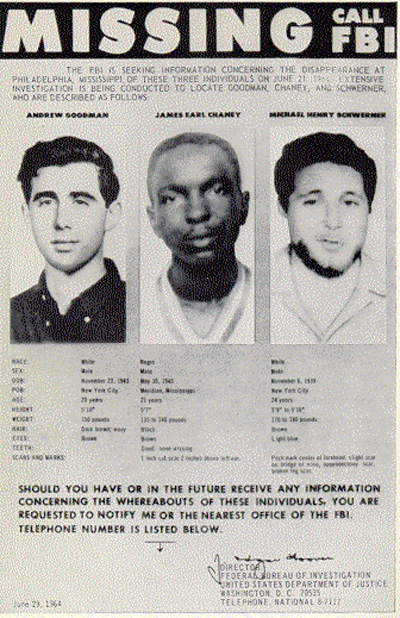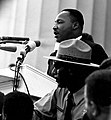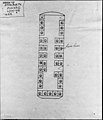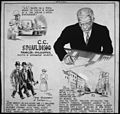The civil rights movement portal The civil rights movement was a social movement and campaign from 1954 to 1968 in the United States to abolish legalized racial segregation, discrimination, and disenfranchisement in the country. The movement had its origins in the Reconstruction era during the late 19th century and had its modern roots in the 1940s, although the movement made its largest legislative gains in the 1960s after years of direct actions and grassroots protests. The social movement's major nonviolent resistance and civil disobedience campaigns eventually secured new protections in federal law for the civil rights of all Americans. After the American Civil War and the subsequent abolition of slavery in the 1860s, the Reconstruction Amendments to the United States Constitution granted emancipation and constitutional rights of citizenship to all African Americans, most of whom had recently been enslaved. For a short period of time, African-American men voted and held political office, but as time went on Blacks were increasingly deprived of civil rights, often under the racist Jim Crow laws, and African Americans were subjected to discrimination and sustained violence by white supremacists in the South. Over the following century, various efforts were made by African Americans to secure their legal and civil rights, such as the civil rights movement (1865–1896) and the civil rights movement (1896–1954). The movement was characterized by nonviolent mass protests and civil disobedience following highly publicized events such as the lynching of Emmett Till. These included boycotts such as the Montgomery bus boycott, "sit-ins" in Greensboro and Nashville, a series of protests during the Birmingham campaign, and a march from Selma to Montgomery. At the culmination of a legal strategy pursued by African Americans, in 1954 the Supreme Court struck down the underpinnings of laws that had allowed racial segregation and discrimination to be legal in the United States as unconstitutional. The Warren Court made a series of landmark rulings against racist discrimination, including the separate but equal doctrine, such as Brown v. Board of Education (1954), Heart of Atlanta Motel, Inc. v. United States (1964), and Loving v. Virginia (1967) which banned segregation in public schools and public accommodations, and struck down all state laws banning interracial marriage. The rulings played a crucial role in bringing an end to the segregationist Jim Crow laws prevalent in the Southern states. In the 1960s, moderates in the movement worked with the United States Congress to achieve the passage of several significant pieces of federal legislation that authorized oversight and enforcement of civil rights laws. The Civil Rights Act of 1964 explicitly banned all discrimination based on race, including racial segregation in schools, businesses, and in public accommodations. The Voting Rights Act of 1965 restored and protected voting rights by authorizing federal oversight of registration and elections in areas with historic under-representation of minority voters. The Fair Housing Act of 1968 banned discrimination in the sale or rental of housing. (Full article...) Selected article -Plessy v. Ferguson, 163 U.S. 537 (1896), was a landmark U.S. Supreme Court decision ruling that racial segregation laws did not violate the U.S. Constitution as long as the facilities for each race were equal in quality, a doctrine that came to be known as "separate but equal". The decision legitimized the many state laws re-establishing racial segregation that had been passed in the American South ("Jim Crow laws") after the end of the Reconstruction era in 1877. Such legally enforced segregation in the south lasted into the 1960s. The underlying case began in 1892 when Homer Plessy, a mixed-race man, deliberately boarded a whites-only train car in New Orleans. By boarding the whites-only car, Plessy violated Louisiana's Separate Car Act of 1890, which required "equal, but separate" railroad accommodations for white and non-white passengers. Plessy was charged under the Act, and at his trial his lawyers argued that judge John Howard Ferguson should dismiss the charges on the grounds that the Act was unconstitutional. Ferguson denied the request, and the Louisiana Supreme Court upheld Ferguson's ruling on appeal. Plessy then appealed to the U.S. Supreme Court. In May 1896, the Supreme Court issued a 7–1 decision against Plessy, ruling that the Louisiana law did not violate the Fourteenth Amendment to the U.S. Constitution and stating that although the Fourteenth Amendment established the legal equality of whites and blacks it did not and could not require the elimination of all "distinctions based upon color". The Court rejected Plessy's lawyers' arguments that the Louisiana law inherently implied that black people were inferior, and gave great deference to American state legislatures' inherent power to make laws regulating health, safety, and morals—the "police power"—and to determine the reasonableness of the laws they passed. Justice John Marshall Harlan was the lone dissenter from the Court's decision, writing that the U.S. Constitution "is color-blind, and neither knows nor tolerates classes among citizens", and so the law's distinguishing of passengers' races should have been found unconstitutional. (Full article...)General imagesThe following are images from various civil rights movement-related articles on Wikipedia.
Related portalsWikiProjectsSelected biography -Malcolm X (born Malcolm Little, later el-Hajj Malik el-Shabazz; May 19, 1925 – February 21, 1965) was an American Muslim minister and human rights activist who was a prominent figure during the civil rights movement. A spokesman for the Nation of Islam (NOI) until 1964, he was a vocal advocate for Black empowerment and the promotion of Islam within the Black community. A posthumous autobiography, on which he collaborated with Alex Haley, was published in 1965. Malcolm spent his adolescence living in a series of foster homes or with relatives after his father's death and his mother's hospitalization. He committed various crimes, being sentenced to 8 to 10 years in prison in 1946 for larceny and burglary. In prison, he joined the Nation of Islam, adopting the name Malcolm X to symbolize his unknown African ancestral surname while discarding "the white slavemaster name of 'Little'", and after his parole in 1952 quickly became one of the organization's most influential leaders. He was the public face of the organization for 12 years, advocating Black empowerment and separation of Black and White Americans, and criticizing Martin Luther King Jr. and the mainstream civil rights movement for its emphasis on non-violence and racial integration. Malcolm X also expressed pride in some of the Nation's social welfare achievements, such as its free drug rehabilitation program. From the 1950s onward, Malcolm X was subjected to surveillance by the Federal Bureau of Investigation (FBI). (Full article...)Selected image - Missing persons poster created by the FBI in 1964, signed by the Director J. Edgar Hoover. Shows the photographs of Andrew Goodman, James Chaney, and Michael Schwerner. All three were found to have been later murdered by local White Knights of the Ku Klux Klan, and the Neshoba County Sheriff's Office as well as the Philadelphia, Mississippi Police Department were involved in the incident. Did you know?
TopicsSubcategoriesThings to doAssociated WikimediaThe following Wikimedia Foundation sister projects provide more on this subject:
Discover Wikipedia using portals
|
© MMXXIII Rich X Search. We shall prevail. All rights reserved. Rich X Search






















































